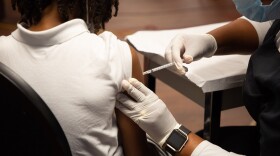The isolation created by the COVID-19 pandemic took a toll on many people’s mental health. That was only amplified for younger people, who are already dealing with uncertainty and stress.
A recent report by Children’s Health in Dallas found that more than 2,100 young people from across Dallas and Plano were admitted to Children’s Health emergency rooms with suicidal thoughts or behaviors. Emergency room visits were between 20% and 30% higher for hospitals in the region than in 2019.
This is on par with national statistics by the Centers for Disease Control that mental health emergency room visits went up 31% during the pandemic. The number increased by more than half among girls aged 12 to 17 in the early months of 2021 compared to 2019.
The Children’s Health report, “Beyond ABC: Assessing the Well-Being of Children in North Texas, highlighted the need for stronger treatment and prevention. It looked at Dallas, Collin, Cooke, Denton, Fannin and Grayson counties, covering nearly 1.2 million children in the region.
How community partners are tackling these issues
For Jennifer Bartkowksi, the CEO of Girl Scouts of Northeast Texas, the statistics are especially concerning. She said the organization put together a mental health initiative in late 2019 before the pandemic started, but realized the continued need for services when girls came together for summer camp this year.
“We started to see that the girls had really elevated levels of feelings of anxiety, depression, even suicidal ideation, levels that we’d never seen before,” Bartkowski said. “We’d seen them come with stuff that we had to manage, but we really needed mental health professionals on-site.”

She said the organization hired more people to support Girl Scout troops, but it realized the need for a safe space for girls needing to talk about their feelings. Girl Scouts of Northeast Texas launched theOkay to Say patch program, a collaboration with the Meadows Mental Health Policy Institute, to teach girls of all ages about mental health and wellness.
“It’s really helping them gain a greater sense of social and emotional confidence,” Bartkowski said.
The need for more pediatric mental health support
While the Girl Scouts of Northeast Texas are tackling mental health with youth directly, there’s also a need for more education and access for pediatric providers.
Pediatric psychiatrist Dr. Mili Khandheria runs the Child Psychiatric Access Network (CPAN), which the state funded in 2019 to address gaps in mental health services for children.
“There’s a huge shortage of child psychiatrists throughout the nation, and particularly in Texas,” Khandheria said. “There’s many counties in Texas with zero child psychiatrists."
CPAN empowers pediatricians and other primary care physicians to treat and assess patients’ mental health, through consultations and ongoing training. Khandheria said about 1,400 providers in North Texas have enrolled since May 2020.
“Why primary care providers have not been [treating mental health issues] is just the unknown,” Khandheria said. “I believe by continuing to educate them about these issues, it’ll aid significantly in their comfort levels.”

Dr. Dawn Johnson, the medical director of Children’s Health Pediatric Group, also said telehealth is one way to improve mental health care for youth. She said it’s improved access to care for people and families who may experience barriers like childcare, transportation and cost.
“I can do telehealth visits with patients while they’re at work at McDonald’s,” Johnson said. “They take a break, get on their [phone], meet with me, and then go back to work. It has given us improved access to care for our most vulnerable populations that may struggle to get to appointments.”
Advice for parents to address youth mental health issues
Both Girl Scout CEO Bartkowski and pediatric physician Khandheria added that beyond health providers and community groups, parents are essential in helping kids get the support they need, especially as the COVID-19 pandemic is ongoing.
Bartkowski said the number one thing kids need is someone to listen to them.
“Talk to your kids early, as soon as they can conceive of what emotions are, help them talk through that,” Bartkowski said. “Mental health is not a joke. It can escalate very quickly. We want to make sure our girls and kids across our community are getting access to the services they need.”
Khandheria echoed that early intervention is key for mental health treatment for young people.
“Depression doesn’t pop up overnight,” Khandheria said. “It begins gradually over time. It’s important for parents and caregivers to watch out for the signs.”
She said that warning signs for young people can include withdrawing, a lack of interest in activities, irritability, changes in eating habits and behavioral issues at school that could include lower grades.
“It was hard with the pandemic, because we were concerned about COVID, and so we were having them practice social distancing, which contributed to their depression symptoms,” Khandheria said. “A lot of the things that help prevent depression is doing those things that we actually said not to do.”
Khandheria said that by addressing these warning signs early, parents can avoid emergency room visits and create a support network with providers for ongoing care.
Got a tip? Email Elena Rivera at erivera@kera.org. You can follow Elena on Twitter @elenaiswriting.
KERA News is made possible through the generosity of our members. If you find this reporting valuable, consider making a tax-deductible gift today. Thank you.






